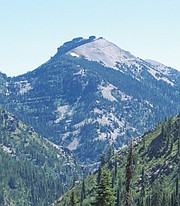Celebrating 50 years of the Wilderness Act
I’m somewhat of an outlander. I grew up on the Clark Fork, not the Kootenai, went to school at Heron and moved to Idaho for high school. But I’ve come back to “The Emerald Empire” many times since, the last time — 25 years ago — to stay.
Like many of us living on this green, rumpled edge between Idaho and Montana, I’ve paid for my choice of domicile in economic terms. This was hardscrabble country when my grandparents moved onto the Clark Fork in 1917. It continues to be. Living here is not an easy way to riches — unless we stop and look around us. When we do that, we find that we live in an extraordinarily rich place, with some of the rarest of resources spread around us in the form of wild country.
This commentary is a celebration of such places. During the next 10 months leading up to the 50th anniversary of the Wilderness Act on Sept. 3, 2014, your neighbors — perhaps, even you — will tell stories of experiences in the wilds of western Montana and northern Idaho, in the Cabinet Mountains Wilderness, the proposed Scotchman Peaks Wilderness and other untamed spots nearby.
The Cabinet Mountains Wilderness, designated when the Wilderness Act was passed in 1964, is a national treasure, but wilderness is not limited to places marked with a capital “W” by Congress. So, too, are the Scotchman Peaks, Ten Lakes, the Roderick in the Yaak and other places I don’t know well, though you might. From Alexander, at the south end of Koocanusa, to Zulu, on the east side of the Roderick, the Kootenai National Forest has more than 40 inventoried roadless areas large and small where the internal combustion machine has not made trails for itself yet. And it’s my hope that it won’t soon.
John Wesley Powell was a great visionary of the 1800s. He traveled the West in a time when the land was not spider-webbed by highways. He ran the Grand Canyon in boats of his own building and nearly died in the doing. He saw many places in a way that no human will ever again in our lifetime or 100 lifetimes to come. But he thought that if it wasn’t all put to use, it was a waste. In his pursuit of Manifest Destiny, he envisioned a West where all arable land was under cultivation and where no water reached the sea. All was diverted for man’s use.
The only trouble with this model is that it doesn’t work, not even for the humans it’s supposed to enrich. A healthy planet needs breathing room, just as we do. Water needs to reach the sea if our rivers are to remain healthy. Witness what’s happened to fisheries since the dams stopped the salmon from running up the Columbia. Witness the Colorado Delta in Mexico, where once Aldo Leopold rowed for days and now a trickle sinks into the ground as a brown, foamy mess of discarded plastic bottles and dying fish many miles from where it once ran into the ocean.
The lesson from Powell’s blueprint for the West is that when we domesticate a river completely, divert it all to our own use, it dies. I would hazard a guess that the same is true of all landscape, whether a freestone stream full of westslope cutthroat or a high divide occupied by alpine larch and elk. These things need space, as we do.
One of my favorite memories is of a day when a friend and I walked 17 hours from Ross Creek Cedars to Ross Creek Cedars; crawling through tag alder into the upper basin of Ross Creek, clambering into the East Fork of Blue Creek, sliding down an elk scramble into the South Fork of Ross Creek and walking out in the dark. A long time in the dark. And we didn’t cross a road, or see another soul.
This commentary, entitled Voices In The Wilderness, will appear in The Western News on the third Friday of each month. Others who love wild places will tell stories about their walk across some solitary spot. Perhaps, a first hunt in the backcountry, or some other special memory of a place without roads. Our greatest riches in this corner of Montana is that sort of space, room to be, to breathe, to walk and wander, and fish and hunt as our ancestors did centuries ago, before John Wesley Powell even saw the country.
Visit the new office Friends of Scotchman Peaks shares with Montana Wilderness Association at 108 Fourth Street, Suite 205 (follow the signs upstairs from the Fourth Street entrance) for an open house from noon to 5:30 p.m. Nov. 20.
And join FSPW for a presentation of bears at the VFW the same day beginning at 6 p.m. Winter office hours in Libby will be Wednesdays from 9 a.m. to 4 p.m.
(Sandy Compton is program coordinator for Friends of Scotchman Peaks Wilderness.)



